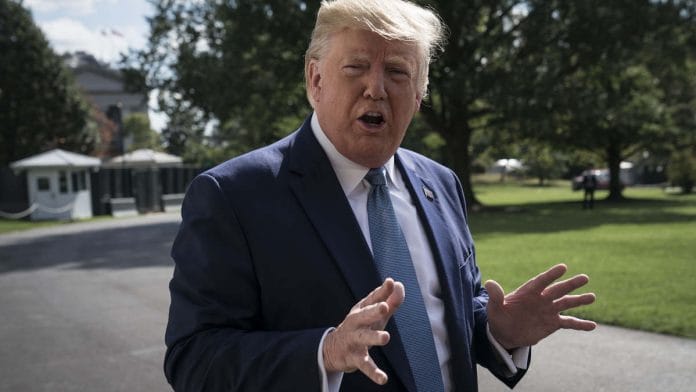London: Global efforts to control polio and tuberculosis stand to suffer alongside the battle against the pandemic as a result of U.S. President Donald Trump’s plans to withdraw from the World Health Organization.
Trump’s decision last week to terminate the U.S. relationship with the global health body, about a month after he halted funding, leaves many unanswered questions. If he plans to withdraw all U.S. financing and expertise from the WHO, scientists fear a resurgence of deadly diseases the agency has spent years trying to destroy.
“I’m very disappointed that the U.S. would even be thinking of leaving such a vital multinational organization without anything to replace it,” said David Heymann, a professor of infectious disease epidemiology at the London School of Hygiene & Tropical Medicine, who has worked with the WHO for decades. “It would cause a hole in the polio eradication that would have to be filled” and affect many other programs.
While the WHO has faced criticism over the years from a number of countries about transparency and financing, no developed nation has ever withdrawn. Trump instructed his administration to temporarily halt funding to the WHO in April, saying the group had taken China’s claims about the coronavirus “at face value” and failed to share information about the pandemic. It’s not clear whether he plans to only withdraw funding, which means the U.S. would lose voting rights on global health initiatives, or to exit the entire treaty.
WHO Director-General Tedros Adhanom Ghebreyesus addressed Trump’s announcement for the first time Monday, thanking the U.S. for its past contributions and saying the agency hopes to continue its partnership. He declined to answer a question about the process for a country to withdraw. A spokeswoman for the agency didn’t respond to requests for comment on the impact.
The U.S. contributed about 15% of the WHO’s funding to wipe out polio in 2018-19, more than a fifth of its funds for HIV and roughly 32% of the money used to tackle tuberculosis, according to financial statements from the health agency. As health authorities have mobilized against the coronavirus pandemic, attention to other diseases has already suffered, yet tuberculosis killed 1.5 million people in 2018 — about four times the number that have died of Covid-19.
Lawyers, scientists and academics who have worked with both the U.S. and the WHO say that financing is only half the picture, and that the expertise the U.S. brings and shares is as important. The health agency won’t be the only party losing out if Trump goes ahead.
Also read: US raises ante in race for coronavirus vaccine with pledge of $1.2 billion to AstraZeneca
“This is a reckless act that endangers U.S. public health as well because it weakens the WHO by depriving it of resources and relationships,” said Daniel Spiegel, U.S. President Bill Clinton’s former ambassador to the United Nations in Geneva. “It will weaken the organization’s ability to deal with the pandemic globally, and that’s not good for the U.S. either. At many different levels, this is a self-inflicted wound and a disastrous policy.”
The WHO is funded by a mix of assessed and voluntary funding. The so-called assessed funding is a fee paid by member countries relative to wealth and population, with the U.S. the largest contributor. It’s unclear when any halt in payments would take effect or how much authority Trump has to suspend disbursements, which are authorized by Congress.
Fees make up about 20% of the total WHO budget. The rest comes from the voluntary contributions, where the U.S. is also among the biggest donors.
Knowledge Gaps
Permanent U.S. staff at the agency would most likely be unaffected, according to lawyers and scientists. Less clear is the outlook for the collaborations between the WHO and U.S. agencies such as the Centers for Disease Control and Prevention and the National Institutes of Health, where employees often get seconded to the global agency.
It would also leave gaps in knowledge and relationships with those nations that don’t want to deal with the U.S. directly, according to Thomas Bollyky, director of the global health program at the Council on Foreign Relations.
“There are many places where the U.S. struggles to engage bilaterally on health emergencies,” but where the WHO can, Bollyky said. America is “really reliant” on the WHO in a number of countries, which is why the U.S. has invested so much over the years.
WHO officials have said they responded appropriately to the coronavirus and pushed China in private meetings for full transparency. An independent review of the response, including the WHO’s role, was approved last month, and Ghebreyesus said he welcomed the scrutiny.
But for the U.S. to leave in the middle of the pandemic, creating potential holes in other funding areas, means the agency will have more than the aftermath of Covid-19 to deal with in the months to come.
“The WHO is under huge pressure,” said David Harper, a senior fellow at U.K. think tank Chatham House and a former chief scientist in Britain’s Department of Health. “This isn’t the sort of thing that they would want to happen at any time, but particularly when there’s a pandemic sweeping the world.”- Bloomberg
Also read: US will consider rejoining WHO if it ends corruption & reliance on China: White House






